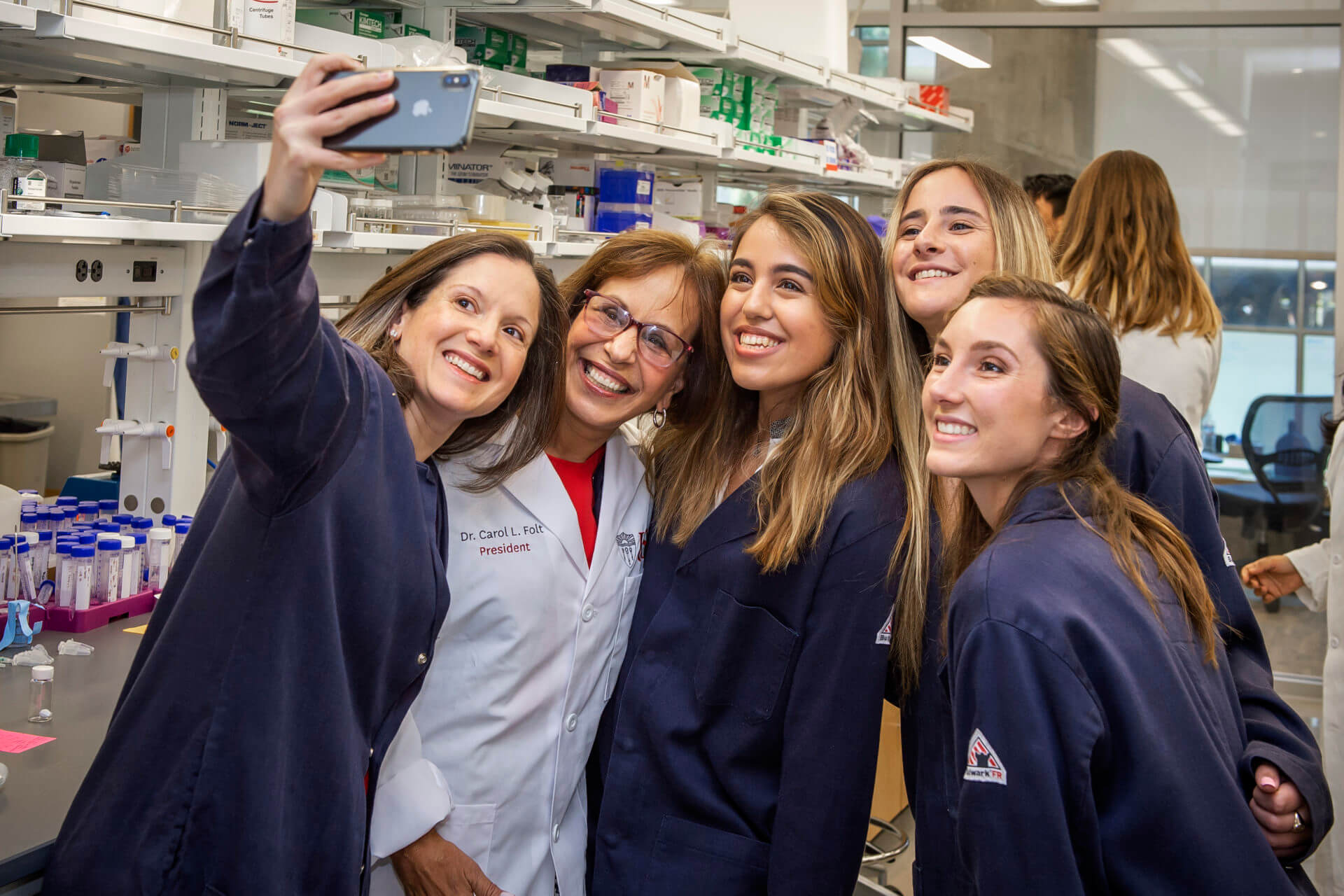Carol Folt, USC’s 12th President, Wants to Leverage the Power of STEM

USC President Carol L. Folt believes in the power of STEM to improve society in myriad ways.
That’s why she wasted no time in connecting with USC Viterbi researchers and students when she became USC’s president in July 2019.
Within her first few weeks, for example, she visited the labs of faculty members Andrea Armani, the Ray Irani Chair in Chemical Engineering and Materials Science, and Eun Ji Chung, a biomedical engineer and the USC Viterbi School of Engineering’s The Dr. Karl Jacob Jr. and Karl Jacob III Early Career Chair. Consistent with Folt’s strong belief in the value of research to improve society, she asked the faculty members about their work projects, many of which could potentially advance medical research and care.
She also peppered Armani’s and Chung’s students with questions, curious to learn what the labs’ undergraduates and graduate students cared about. Armani, who helped invent a portable optical diagnostics system that can perform rapid malaria screenings in low-resource environments in only 10 minutes, is a World Economic Forum Young Global Leader; Chung was recently named a Biomedical Engineering Society Rising Star in Cellular Molecular Bioengineering.
In the many months since, Folt has underscored the importance of opening access to a college education to more students. That came to fruition in February, when Folt announced several moves to make a USC education more affordable, including expanding financial aid so that undergraduate students from families earning $80,000 or less a year can attend the university tuition-free.
An ecologist by training, Folt—who serves as a professor of preventive medicine, biological sciences, and civil and environmental engineering—has long demonstrated a commitment to interdisciplinary collaboration to solve society’s major challenges.
In Folt’s vision, Trojan engineers, scientists and others would continue to work together to find ways to improve the air, slow climate change and make cities more livable. She hopes to lower barriers among researchers of different disciplines to facilitate the free flow of ideas to spark innovation. One example of this spirit of collaboration is the USC Michelson Center for Convergent Bioscience, which she has said “really epitomizes USC’s interdisciplinary work.
Folt has called furthering sustainability a top priority. Among her goals is taking effective action to lower the carbon, water and waste footprints of the USC campuses and the L.A. region. Her values parallel those of USC Viterbi Dean Yannis C. Yortsos, who has long believed that engineers have a moral imperative to improve the environment, among other ambitious tasks.
She has also signaled strong support for women and underrepresented minorities at USC and beyond. Underscoring her commitment to diversity, she met with members of Women in Science and Engineering within her first week of arriving at USC. She has long been an advocate for growing inclusion within STEM fields.
While serving as chancellor at the University of North Carolina at Chapel Hill—her previous leadership post—the diversity of students grew significantly. About 20 percent of UNC-Chapel Hill students were in the first generation of their family to attend college. The university also attracted its most academically accomplished classes ever.
“Carol Folt’s entire career, as both a faculty member and leader, embodies a commitment to all aspects of academic excellence while always putting people first,” said Yaniv Bar-Cohen, past president of the USC Academic Senate and professor of clinical pediatrics and medicine at the Keck School of Medicine of USC, after the announcement of her presidency last year.
Folt is optimistic about USC’s future. “USC is a world-class global research university, and I am deeply grateful to the USC community and its leaders for giving me the privilege of serving as its president,” said Folt when the USC Board of Trustees announced her selection as president in March 2019. “The opportunities and potential I see ahead for USC are extraordinary.”
Alicia Di Rado contributed to this report.



